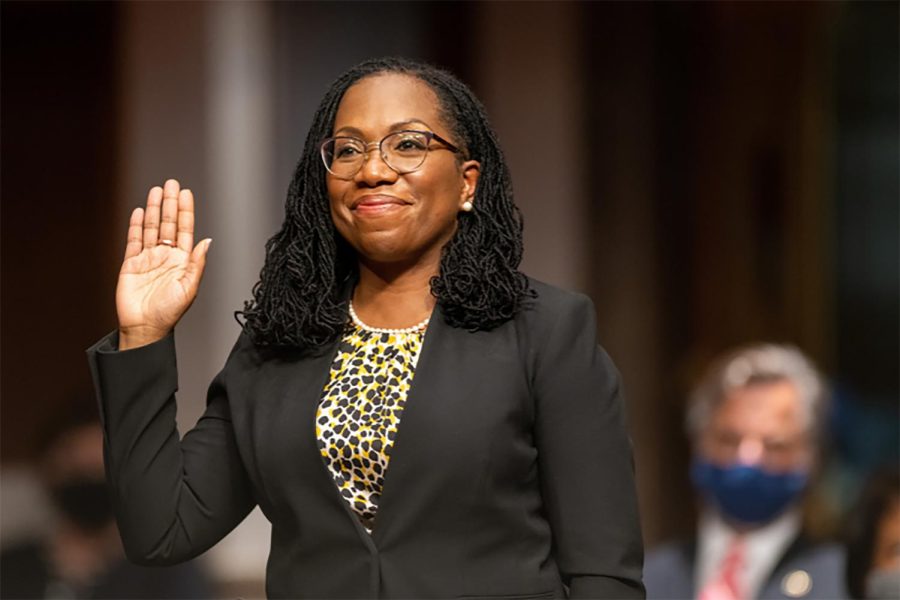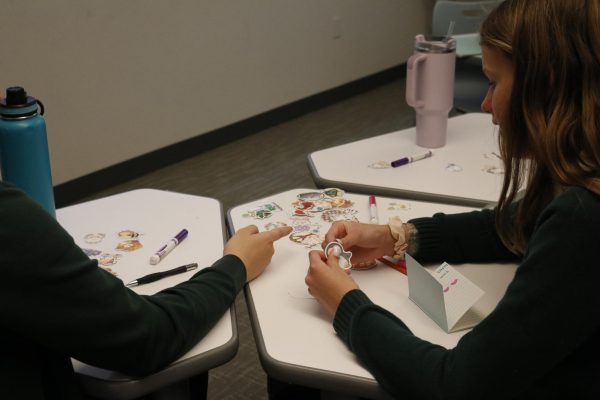Archer students reflect on Next Supreme Court Justice Ketanji Brown Jackson’s ‘impactful’ confirmation
Photo credit: Committee on the Judiciary.gov
Next Supreme Court Justice Ketanji Brown Jackson is sworn in prior to testifying before the Senate Judiciary Committee April 28. On April 7, the Senate voted in favor of her confirmation.
May 9, 2022
As the Schuyler sisters say in the Broadway musical “Hamilton,” “look around at how lucky we are to be alive right now, history is happening and it happens to be in the greatest city in the world.”
Judge Ketanji Brown Jackson’s nomination to the Supreme Court was announced Friday, Feb. 25, by President Joe Biden. He fulfilled his promise to the American public to nominate a Black woman to the Supreme Court when he picked Jackson as the first Black woman to be nominated to the Supreme Court. After her confirmation hearings, the Senate approved her confirmation to the Supreme Court, Thursday, April 7.
In the United States, Supreme Court justices hold office as long as they choose to or until they pass away. When a sitting Supreme Court justice decides to retire or passes away, the president then gathers a list of possible selections to succeed the sitting justice and makes a final decision on who to nominate. Next, the Senate conducts confirmation hearings with the nominee in order to assess whether they approve of the nomination or not. Finally, the Senate votes to confirm the nominee to the Supreme Court, and if a majority votes for the confirmation, the president holds a swearing-in ceremony to officially induct the nominee to the Supreme Court.
“I was really happy that President Biden appointed someone of color, or, specifically, a Black woman to be in such high power, because there’s a lot of lack of representation of people of color,” senior Lexi Tooley said. “Over the past couple of months and years, there’s been a lot going on in these fields and realms of power, and I was just very happy to see that someone that looks like me was going to be in this position, or possibly be in this position.”
Freshman Sydney Curry said she believes Jackson’s nomination was a long time coming and is looking forward to the representation and voice that she will bring, being a part of a high power institution.
“I think it’s so important that our Supreme Court and so many of our institutions match America’s diversity,” Curry said. “It’s a nod to not only what our society should value, but a sign that we are progressing as a society, that we’re overcoming barriers that we have constantly been fighting for.”
Although Jackson will not be the first woman to sit on the Court, she is carrying on the legacy of many women who have sat on the Court and are currently sitting, including the late Justice Ruth Bader Ginsburg and Sandra Day O’Connor and current justices Sonia Sotomayor and Elana Kagan. Junior Ella Poon said she hopes Jackson will be a role model for young girls and pave a pathway for women of color to take on roles like hers.
“I hope [she] will inspire a lot of other people. I think about most young girls who will look up to her and be like, ‘That’s what I want to be,'” Poon said. “That means a lot, because that means we can get even more girls in politics, on [the] Supreme Court.”
Tooley said she is also hopeful for the positive impact that Jackson will have on the U.S. and the world. As a person of color, Tooley said she is happy to see someone that looks like her modeling what it looks like to be a successful Black woman utilizing her voice and representing the country. Tooley said she also believes Jackson will be able to reimplement the idea of democracy and democratic practices for American citizens, but at the same time, value law and justice.
It’s a nod to not only what our society should value, but a sign that we are progressing as a society, that we’re overcoming barriers that we have constantly been fighting for.
— Sydney Curry ('25)
“I’m hoping that she sways a little bit, or at least gets people to open their minds because so many people are just not really thinking about the entire U.S. and just thinking about themselves in their party,” Tooley said. “But I think that with her on Supreme Court, she’s going to be able to teach other younger generations of kids and also the people that she’s around, and hopefully make the world a better place.”
Poon said that having Jackson on the Supreme Court will help to lessen the polarization and politicization that has been occurring with issues such as women’s rights and access to abortions, police brutality, climate change and voting rights.
“Right now, what’s been most difficult in the Supreme Court is it seems to become very involved in politics,” Poon said. “I wish it wasn’t that way, but I also feel like we have to accept the reality that it is what it is right now and work with it. But I hope that we’ll shift away from bi-polarization and it will stop influencing the Supreme Court as much.”
Curry shared a similar perspective on the polarization and politicization that has been prominent recently in the U.S.
“I hope we can get to a point where our Supreme Court is not so separated. In our country, right now, everything is so polarized; it’s democratic, republican, liberal, conservative,” Curry said. “I hope we can see that bridge and opinions but also still having our Supreme Court not only represent us, but represent all of us.”
As Poon, Tooley and Curry said, Judge Jackson will provide a fresh voice and perspective that many Americans have been waiting for on the Supreme Court.
On April 7, the U.S. Senate voted 53-49 in favor of confirming Jackson to the Supreme Court. History is in the making, as Jackson will be the 116th Supreme Court Justice of the U.S. starting in June.
“If you can see something, you can imagine that you can aspire to be that, so I think we will continue to see more and more people aiming to be that force that she is,” Curry said. “I think also having that added perspective in the room or in the rooms that matter is so important because it changes our politics or changes our policies … She sits on the highest court you could be on, I think it’d be something that’s really impactful.”





![Freshman Milan Earl and sophomore Lucy Kaplan sit with their grandparents at Archer’s annual Grandparents and Special Friends Day Friday, March 15. The event took place over three 75-minute sessions. “[I hope my grandparents] gain an understanding about what I do, Kaplan said, because I know they ask a lot of questions and can sort of see what I do in school and what the experience is like to be here.](https://archeroracle.org/wp-content/uploads/2024/03/grandparents-day-option-2-1200x800.jpg)





























































